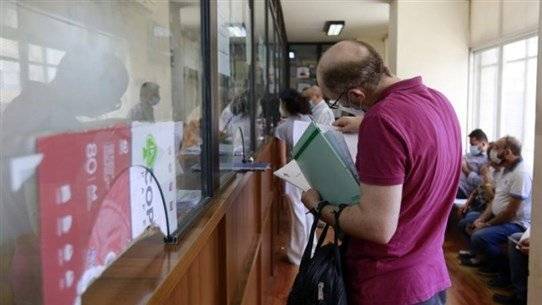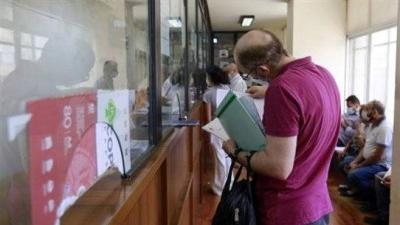Transactions in government departments and institutions are being completed as best as possible. Amid an unprecedented and ongoing financial crisis, it has become difficult to complete transactions within their normal time frames. Even those that were once considered routine have now become a struggle, and obtaining an individual civil registry certificate from the civil status offices or a financial number from the Ministry of Finance or a real estate certificate feels like winning a "Lotto" ticket in times of collapse. Today, there is a crisis, simple as it may seem, but it paralyzes many state institutions: a severe shortage of office supplies necessary to complete transactions, from white paper to receipt papers to stationery, not to mention electricity. The absence of these essentials transforms the task of issuing an important official document into an impossible mission. The primary reason leading to this setback lies in one place: the difference between the state's "lira" and the market dollar on which most services are priced. All office supply costs are still recorded in the state budget in Lebanese lira, based on an official exchange rate of 1507 liras, while these supplies are imported. This has led to halted tenders since the price disparity between what the state provides and what importers demand prevents the initiation of bidding processes, costing multiples of the allocated credits. This situation reflects the state of these institutions, where officials strive to manage their affairs "in the best way possible," as stated by Elias Khoury, the Director General of Civil Affairs.
What is happening "in the best way possible" is no longer confined to one location but can be generalized to most of the 93 public institutions and ministries, some of which have become out of service for citizens.
**Vehicle Registration Department**
Since April 4, operations at the Vehicle Registration Department have completely ceased. A combination of factors, including the COVID-19 pandemic, which necessitated reduced attendance in that administration, the fuel crisis, and the "bankruptcy" it now suffers concerning office supplies, have led to this outcome. The department's crisis stems from its budget allocations based on the 1507 lira rate, as it still operates under the previous budget, given that the current budget with its amendments has not come into effect. Sources indicate that "the allocated credits were exhausted in July of last year, and the crisis began to appear." There was a stroke of luck that delayed the crisis until that time: the decision to reduce working hours due to the COVID-19 pandemic, which allowed some functioning within the department. However, this didn’t last long, as the department required supplies pivotal to its functioning, needing "between 10,000 to 15,000 receipts daily for transactions like mechanics, release of liens, and lifting of attachments." By other calculations, the department needed about "50 boxes of receipt paper" within the two working days designated by the state. Since the department could not increase its allocations due to the absence of a new budget and since the current demands "require a decree in the Council of Ministers to request additional contributions," it turned to the Ministry of Finance "to secure receipts," initially relying on the surplus from the Ministry of Finance. However, this was not sufficient, which led the administration to seek "donations," providing some relief while also instituting rationing measures within the department itself. In this context, one employee comments that "the administration, for instance, has started giving us paper sheet by sheet, not by the box, and we sometimes have to use used paper, asking citizens to bring their own paper if it's a routine transaction. Some employees have begun sharing the cost of printer ink to complete their work." However, all of these measures have failed to cover the severe shortage of supplies, particularly receipts, which have become increasingly scarce. Additionally, the Ministry of Finance has been unable to continue the help it initially provided, coinciding with employee strikes over their inability to reach their workplaces.
Mid-month, the Council of Ministers approved an "additional contribution," but the implementing decree has not yet been issued, hindering the subsequent processes, such as initiating printing tenders typically conducted by the department through the Geographic Affairs Directorate at the Lebanese Army's printing press.
**Finance: A Three-Dimensional Crisis**
In the Ministry of Finance, the situation is not better. It can no longer rely on any surplus to distribute to institutions that resort to it when they face bankruptcy, leading to an increasingly complex crisis. While it addresses some aspects related to supplies by halting work or being lenient with citizens' requests, these solutions are not always effective.
The crisis in finance can be described as follows: either there is fuel "but the generator is broken," or the generator is operational "but there is no fuel," or there is both a generator and fuel "but there is no ink for the printer," or all those elements are available "but there is no paper." Recently, the Ministry of Finance has become more lenient in its paper consumption requests, opting to "provide the financial number, for example, on a scrap of paper with the applicant or photograph it with a phone camera." Nonetheless, the crisis has not abated since the major issue today is the absence of maintenance contracts for everything, which often halts operations.
**Interior Ministry**
Conditions at the Civil Status Directorate in the Ministry of Interior and Municipalities are not different from most government facilities, particularly those that are usually in direct contact with citizens. Nevertheless, it has "benefited" somewhat from the "advance" during the parliamentary elections, using the savings realized during "election work" to facilitate transactions in the civil status offices. However, this advance, according to Khoury, is more akin to a sedative than a windfall, especially given the lack of tenders due to the fundamental crisis regarding the price disparity between the lira and the dollar. Consequently, there was a reliance at one point on what donors offered in terms of supplies, and those contributing "money, for example, we asked to provide it directly to the Lebanese Army's printing press, where we do the printing."
On another note, the directorate faces the same crisis regarding identity cards that the General Security experiences in issuing passports since it is the same company responsible for both. While Khoury reassures that there is no crisis this year, it is difficult to predict what the situation might be like afterward. Nevertheless, he indicates that the Finance and Budget Committee approved a request for 15 billion lira necessary for identity card printing, and it is expected that "we have a document in our hands" to negotiate with the company.
Thus, matters in the directorate progress: step by step. For this reason, Colonel Khoury establishes a "work program" for the civil status offices based on the principle of "providing each office every week, according to what was consumed in the previous week," meaning "so we don’t exaggerate our needs."




